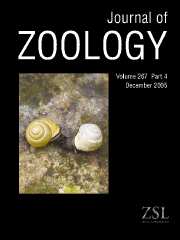Crossref Citations
This article has been cited by the following publications. This list is generated based on data provided by
Crossref.
Ruiz-Olmo, Jordi
Olmo-Vidal, Josep Maria
Mañas, Sisco
and
Batet, Antoni
2002.
The influence of resource seasonality on the breeding patterns of the Eurasian otter (Lutra lutra) in Mediterranean habitats.
Canadian Journal of Zoology,
Vol. 80,
Issue. 12,
p.
2178.
Clavero, Miguel
Prenda, José
and
Delibes, Miguel
2003.
Trophic diversity of the otter (Lutra lutraL.) in temperate and Mediterranean freshwater habitats.
Journal of Biogeography,
Vol. 30,
Issue. 5,
p.
761.
Torres, J.
Feliu, C.
Fernández-Morán, J.
Ruíz-Olmo, J.
Rosoux, R.
Santos-Reis, M.
Miquel, J.
and
Fons, R.
2004.
Helminth parasites of the Eurasian otter Lutra lutra in southwest Europe.
Journal of Helminthology,
Vol. 78,
Issue. 4,
p.
353.
Hung, Chih‐Ming
Li, Shou‐Hsien
and
Lee, Ling‐Ling
2004.
Faecal DNA typing to determine the abundance and spatial organisation of otters (Lutra lutra) along two stream systems in Kinmen.
Animal Conservation,
Vol. 7,
Issue. 3,
p.
301.
Ruiz‐Olmo, Jordi
Margalida, Antoni
and
Batet, Antoni
2005.
Use of small rich patches by Eurasian otter (Lutra lutra L.) females and cubs during the pre‐dispersal period.
Journal of Zoology,
Vol. 265,
Issue. 4,
p.
339.
Prigioni, C.
Remonti, L.
Balestrieri, A.
Sgrosso, S.
Priore, G.
Misin, C.
Viapiana, M.
Spada, S.
and
Anania, R.
2005.
Distribution and sprainting activity of the Otter (Lutra lutra) in the Pollino National Park (southern Italy).
Ethology Ecology & Evolution,
Vol. 17,
Issue. 2,
p.
171.
Lanszki, J.
Molnár, M.
and
Molnár, T.
2006.
Factors affecting the predation of otter (Lutra lutra) on European pond turtle (Emys orbicularis).
Journal of Zoology,
Vol. 270,
Issue. 2,
p.
219.
Lanszki, J.
and
Sallai, Z.
2006.
Comparison of the feeding habits of Eurasian otters on a fast flowing river and its backwater habitats.
Mammalian Biology,
Vol. 71,
Issue. 6,
p.
336.
Lanszki, József
Pallos, Zsuzsanna S.
Nagy, Dénes
and
Yoxon, Grace
2007.
Diet and fish choice of Eurasian otters (Lutra lutra L.) in fish wintering ponds in Hungary.
Aquaculture International,
Vol. 15,
Issue. 5,
p.
393.
Ruiz-Olmo, Jordi
Jiménez, Juan
and
Chacón, William
2007.
The importance of ponds for the otter (Lutra lutra) during drought periods in Mediterranean ecosystems: A case study in Bergantes River.
mammalia,
Vol. 71,
Issue. 1/2,
Lanszki, J.
Hidas, A.
Szentes, K.
Révay, T.
Lehoczky, I.
and
Weiss, S.
2008.
Relative spraint density and genetic structure of otter (Lutra lutra) along the Drava River in Hungary.
Mammalian Biology,
Vol. 73,
Issue. 1,
p.
40.
Remonti, Luigi
Prigioni, Claudio
Balestrieri, Alessandro
Sgrosso, Silvia
and
Priore, Giuseppe
2008.
Trophic flexibility of the otter (Lutra lutra) in southern Italy.
Mammalian Biology,
Vol. 73,
Issue. 4,
p.
293.
Remonti, Luigi
Prigioni, Claudio
Balestrieri, Alessandro
Sgrosso, Silvia
and
Priore, Giuseppe
2008.
Distribution of a recolonising species may not reflect habitat suitability alone: the case of the Eurasian otter (Lutra lutra) in southern Italy.
Wildlife Research,
Vol. 35,
Issue. 8,
p.
798.
Blanco-Garrido, Francisco
Prenda, José
and
Narvaez, Marta
2008.
Eurasian otter (Lutra lutra) diet and prey selection in Mediterranean streams invaded by centrarchid fishes.
Biological Invasions,
Vol. 10,
Issue. 5,
p.
641.
Melero, Yolanda
Palazón, Santiago
Bonesi, Laura
and
Gosàlbez, Joaquim
2008.
Feeding habits of three sympatric mammals in NE Spain: the American mink, the spotted genet, and the Eurasian otter.
Acta Theriologica,
Vol. 53,
Issue. 3,
p.
263.
Ruiz-Olmo, Jordi
and
Jiménez, Juan
2009.
Diet diversity and breeding of top predators are determined by habitat stability and structure: a case study with the Eurasian otter (Lutra lutra L.).
European Journal of Wildlife Research,
Vol. 55,
Issue. 2,
p.
133.
Ottaviani, D.
Panzacchi, M.
Jona Lasinio, G.
Genovesi, P.
and
Boitani, L.
2009.
Modelling semi-aquatic vertebrates’ distribution at the drainage basin scale: The case of the otter Lutra lutra in Italy.
Ecological Modelling,
Vol. 220,
Issue. 2,
p.
111.
Crimmins, S. M.
Roberts, N. M.
Hamilton, D. A.
and
Mynsberge, A. R.
2009.
Seasonal detection rates of river otters (Lontra canadensis) using bridge-site and random-site surveys.
Canadian Journal of Zoology,
Vol. 87,
Issue. 11,
p.
993.
Gallant, D.
Vasseur, L.
Dumond, M.
Tremblay, E.
and
Bérubé, C. H.
2009.
Habitat selection by river otters (Lontra canadensis) under contrasting land-use regimes.
Canadian Journal of Zoology,
Vol. 87,
Issue. 5,
p.
422.
Remonti, Luigi
Balestrieri, Alessandro
and
Prigioni, Claudio
2009.
Altitudinal gradient of Eurasian otter (Lutra lutra) food niche in Mediterranean habitats.
Canadian Journal of Zoology,
Vol. 87,
Issue. 4,
p.
285.




